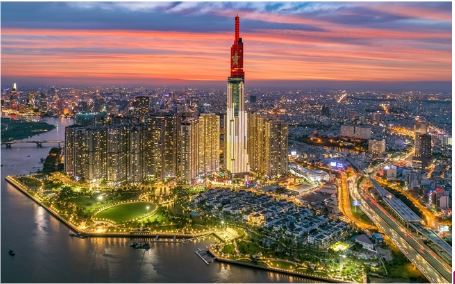According to the Asian Development Bank (ADB) forecast in April 2023, Vietnam is poised to become one of the fastest-growing economies in the Southeast Asian region, despite the impact of the COVID-19 pandemic. Over the past five years, the Vietnamese economy has demonstrated strong growth, driven by increasing domestic demand and the rapid development of the manufacturing and processing industries, along with a continuous influx of foreign direct investment.
Based on recent events related to the situation in China, renowned global corporations have made decisions to gradually shift their manufacturing bases to Vietnam. Specifically, Apple has brought 11 companies involved in its supply chain to Vietnam, while LEGO Group has started construction on a production center in Binh Duong worth nearly $1 billion, which is expected to commence operations around 2024. China’s restrictions on production have prompted major corporations and investors to explore new investment destinations to reduce their dependence on that country. Therefore, Vietnam is among the top attractive investment destinations, drawing significant foreign capital.
According to the foreign investment data for January 2023 from the Ministry of Planning and Investment, the total foreign investment in Vietnam reached nearly $1.7 billion. This can be explained by the fact that the month included two major holidays, Christmas and the Lunar New Year, which typically involve extended breaks. Although there was a decline compared to the same period in 2022, the total registered capital for new investments still accounted for 48.5% compared to the same period the previous year. Among the 22 sectors attracting foreign investment, the manufacturing sector leads the way, followed by logistics at 4.9% and the hotel and tourism sector at 3.6%.

The Vietnamese government has consistently made significant efforts to improve its institutional framework and legal framework. Firstly, the revision and enactment of the Enterprise Law and the Investment Law in 2014 helped reduce cumbersome and burdensome regulations for the business community. As a result, foreign direct investment (FDI) enterprises have been provided with an even better environment to confidently invest and develop.
Furthermore, in 2020, Vietnam ranked among the top 70 economies in the world in terms of competitiveness (according to the World Bank’s Competitiveness Index). Towards the end of 2020, the National Assembly approved amendments to the Planning and Investment Law, which took effect at the beginning of 2021. Thanks to these proactive changes and improvements, it is not difficult to understand why investors continue to choose Vietnam as a leading investment destination
With its favorable geographical location and shared borders with multiple countries, Vietnam has a strategic advantage that positions it as a key investment destination in Southeast Asia. Its long coastline also provides ideal conditions for investments in maritime industries, tourism, and, notably, the potential to develop into a regional financial center.
Moreover, Vietnam possesses vast and diverse natural resources, including iron ore, aluminum, copper, manganese, nickel, and more. These resources present opportunities for investment in mining and extractive industries, supporting both domestic production and exports.
Additionally, Vietnam is rich in agricultural resources. The country is one of the world’s largest exporters of rice, coffee, and seafood. Its fertile land and favorable climate offer investment potential in agriculture and agribusiness, including crop cultivation, aquaculture, and food processing industries.

In addition to its rapidly developing economy, Vietnam takes pride in its nearly 60 million labor force, with half of the population under 39 years old. The government has focused on educational reforms and policies aimed at promoting the workforce through vocational training. It has implemented reforms to increase productivity, skills, and the quality of the labor force. Approximately 95% of the workforce is literate, 5% are proficient in English, and 10% are considered to have “high-level skills.”
Another competitive advantage attracting investors to Vietnam is its highly competitive minimum wage compared to other Asian countries. The minimum wage ranges from US$132 per month to US$190 per month, depending on the economic region. With this competitive wage rate, many investors are looking to shift their supply chains to Vietnam as a cost-cutting alternative.
Several large manufacturing companies and supply chains have already relocated their factories to Vietnam, including Foxconn, Panasonic, LG, Google, and Intel. This shift is further facilitated by the government’s support for FDI through free trade agreements and tax incentives.
With impressive economic growth, an investor-friendly environment, and ongoing development potential, Vietnam is truly a promising investment destination for foreign businesses.